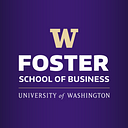4 Tips to Be Successful at Your Next Internship
Plan ahead, start networking, and use feedback to improve your experience at your next internship
Written by: Lalia Baldeh, Student and Peer Career Coach | EY Center for Career Advancement, University of Washington Foster School of Business
Employment in a large corporation isn’t just about the job, rather it’s a well-rounded experience that opens doors for opportunities for personal and professional development. I was a consulting intern last summer at PwC and I had a good experience. It can be challenging to navigate large companies as there’s always a lot happening, but there are measures you can take to prosper at any firm.
Here are four strategies to be successful at your next internship.
1. Networking
Networking is a topic that is frequently discussed among Foster School of Business students at the University of Washington. It is a crucial aspect of building collaborative and effective teams in the workplace. Employees with strong professional relationships are more likely to work together effectively, share ideas, and collaborate on projects, ultimately leading to improved team performance. Additionally, networking provides employees with valuable opportunities for career development.
By building relationships with colleagues and mentors within the company, you can gain mentorship, guidance, and exposure to career advancement opportunities. I made sure to attend all the lunch and learn sessions as well as make plans with my co-workers outside of work. Take the initiative to engage in meaningful conversations and put yourself out there!
2. Planning
Effective planning is essential for a successful internship experience. As an intern, your time is limited, and maximizing your opportunities is key.
Before starting your role, take a strategic approach to identify specific goals, develop a schedule, and seek out diverse learning opportunities. A well-crafted plan demonstrates your commitment to the internship, even if you’re unsure of your objectives.
In the initial week of my internship, I made a plan that involved scheduling a one-on-one virtual meeting with a PwC staff member from another department, determining the certifications I aimed to acquire, and organizing my eight-hour workdays.
3. Balancing working from home and in-person
In the current era, the possibility of working from home is becoming increasingly common. However, despite the appeal of remote work, there are undeniable benefits to coming into the office a few times a week.
Being physically present in the office allows for impromptu conversations and interactions, which can help to create a cohesive team culture among colleagues. During my internship, my team and I made a point of going into the office regularly. This allowed us to develop a strong bond, which in turn enabled us to work efficiently and produce exceptional results.
4. Asking for feedback
It’s natural to feel sensitive about criticism, particularly for young professionals, but these discussions are intended to assist you in reaching even greater heights. At PwC, we met with our supervisor frequently to touch base on client deliverables. I used this time to ask any clarifying questions as well as gain feedback on ways I can improve.
Soliciting constructive feedback is a powerful tool for advancing your career. Even if you believe you’re performing admirably, it’s essential to request feedback from your manager or supervisor. Doing so enables you to pinpoint areas for improvement, comprehend your strengths and weaknesses, and enhance your professional development.
Learn more about the EY Center for Career Advancement at the Foster School of Business here.
